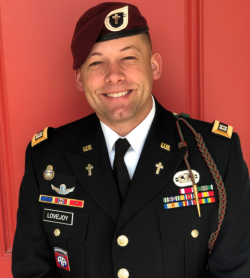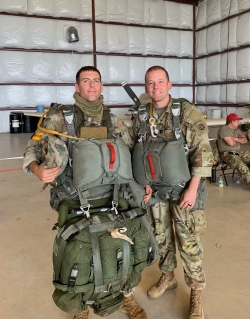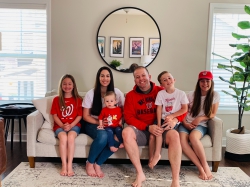Inviting All to the Table
PROVO, Utah – Jan 07, 2022 – When Scott Lovejoy was a newly enlisted medic in the United States Army, he received a surprise visit from his father. The conversation that took place during this visit was a turning point in the 18-year-old’s life, reminding him who he was and how important faith was. This experience, along with his time spent in the Army ROTC program at the BYU Marriott School of Business, ultimately led Lovejoy to his career as a chaplain.
“My conversation with my dad was a pivotal point in my life. Our discussion put me on the path to serve a mission for The Church of Jesus Christ of Latter-day Saints, marry in the temple, and become a chaplain,” says Lovejoy, a 2011 business management graduate. “After serving my mission in São Paulo, I came to BYU Marriott, which only solidified my determination to incorporate faith into my career.”
Lovejoy’s primary responsibilities as a chaplain in the US Army are to advise service members and protect their religious freedoms. He currently serves as chaplain for more than 700 paratroopers at Fort Bragg, North Carolina. These soldiers come from a variety of religious backgrounds, including Judaism, Catholicism, Protestantism, and The Church of Jesus Christ of Latter-day Saints.
No matter what religion his soldiers belong to, Lovejoy wants to help them become better soldiers and people. Elder Neil L. Andersen, an apostle for The Church of Jesus Christ of Latter-day Saints, spoke at a 2015 training session for Latter-day Saint chaplains, and his message resonated with Lovejoy. “Elder Andersen said Latter-day Saint chaplains are perfectly placed to help people of many faiths. We have a strong sense of truth—who we are and where we come from—and we believe everyone can sit at the theological table; there is capacity and space for all God’s children,” Lovejoy explains.
“I approach my role as a chaplain from a Latter-day Saint perspective. My theology is, ‘Come as you are. Let’s talk about the person you want to become and the person God or whoever you believe in wants you to become,’” he continues. Some of the paratroopers Lovejoy oversees are agnostic or atheist, but his responsibilities go beyond just religion—he wants to help cultivate wholeness in the best way for each individual. “I ask the important questions: How can I help you become the best version of yourself? How can I help you accomplish the mission the American people want you to accomplish?” he adds.
Although faith and religion are important components of Lovejoy’s job, another primary role of a chaplain is advisement. He advises company and battalion commanders primarily on morale and ethics. Lovejoy also provides support for struggling soldiers facing all types of problems. “I help soldiers be the best version of themselves. Pushing them to become that person sometimes looks religious, sometimes looks like marriage counseling, or sometimes looks like talking to the soldier and being a friend,” he says.
Lovejoy cares deeply about helping others during times of need because of a tragedy he personally experienced. “Before leaving on my mission, I served as a medic in the army and made some incredible friends. While I was on my mission, one of these friends took his own life. I was absolutely shaken to my core and devastated,” he remembers. “When I discovered chaplaincy later at BYU Marriott, I often thought about my friend and decided that nobody should have to suffer in silence. In my career, I want to touch the lives of those around me so they don’t have to feel alone.”
Lovejoy’s time spent in the Army ROTC at BYU Marriott solidified his convictions regarding the importance of faith and religion in the military. “The BYU ROTC program is phenomenal, not only because of the way the program is structured but also because instructors find ways to incorporate faith. We are reminded that putting on the armor of God is just as important as putting on physical armor,” he shares.
For current BYU ROTC students who might follow Lovejoy’s footsteps into the army, he advises them to closely intertwine faith with military service. “My most important piece of advice for incoming BYU ROTC students is that you cannot divorce your military service from your faith,” he says. “The enabling power that allows you to be the best officer, regardless of what you do in the army, comes from staying true to your faith and testimony.”



Media Contact: Chad Little (801) 422-1512
Writer: Sarah Calvert



